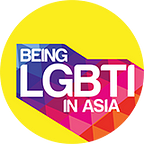Barriers to equality and inclusion for LGBTI people must be dismantled, say panelists at ILGA Asia
7 December 2017
Phnom Penh — National level policies and legislative initiatives have shown they can have a positive impact on social inclusion of lesbian, gay, bisexual, transgender and intersex (LGBTI) people in Asia, but these efforts require mainstreaming to have widespread change, said government and policy makers speaking in a panel discussion today at the ILGA Asia Conference in Phnom Penh.
The panel discussion, titled ‘From margins to mainstream: LGBTI inclusion in national policy and practice’, featured government participants from Bangladesh, Cambodia, India, Thailand and Viet Nam, and was moderated by Edmund Settle, Policy Advisor with the United Nations Development Programme (UNDP) Bangkok Regional Hub.
In the Asia-Pacific region, LGBTI people continue to face both legal and social barriers to equality and inclusion, which must be dismantled for these marginalized populations to fully enjoy their deserved individual rights to development and quality of life.
In Cambodia, the Ministry of Women’s Affairs addresses the rights of LGBT people in three national policies, namely the Fourth National Strategic Plan for Gender Equality (2014–2018), the Second National Action Plan to Prevent Violence on Women (2014–2018) and the Cambodian Gender Assessment 2014. In these policies, and for the first time ever, the Cambodian Government is working to promote the inclusion of LGBT people from a holistic and human-rights based perspective. The Women’s Affairs Ministry also included sexual diversity and gender identity in a program for improving parenting skills, with the goal of promoting understanding and support of Cambodian parents towards their LGBT children.
“At the moment we are undertaking the 16 Days of Activism Campaign to End Gender-Based Violence, where a video on non-violence against LGBT people was showed. In addition, there is a new and ground-breaking program called ‘Leading the Way for Gender Equality’, led by my Ministry and supported by UNDP and the Swedish International Development Cooperation Agency (Sida), aimed at ending discrimination against females from LGBTI community,” said Sineth Sar, Department of Legal Protection, Ministry of Women Affairs, Cambodia. “My advice to CSOs, based on our own extensive experience, is to engage with government agencies early on — at the planning stage. This cooperation can also be reflected in a Memorandum of Understanding that can be signed to provide a specific framework for bilateral collaboration.”
In 2015, Thailand has enacted a Gender Equality Act, which is the first law in the country that explicitly protects people whose gender expression is different from their sex assigned at birth. UNDP, in collaboration with the Ministry of Social Development and Human Security (MSDHS) and the Rainbow Sky Association of Thailand (RSAT), supported the launching of this Act in September 2015 when it first came into force. UNDP is now working with MSDHS and the World Bank Office in Bangkok to roll out a training curriculum on sexual orientation, gender identity and expression (SOGIE) for government officials to effectively implement the Act.
“Besides the Gender Equality Act, the Ministry of Justice is working on a draft civil partnership act which we hope will be ready for submission to the cabinet by the end of next year,” stated Nareeluc Pairchaiyapoom, Director of the International Human Rights Division, Department of Rights and Liberties Protection, Ministry of Justice, Thailand. “The Ministry of Justice also appreciates the cooperation with agencies like the UNDP as their technical assistance on LGBTI issues are valuable and helpful for the development and improvement of our work on the subject matter.”
Speaking about the situation in India, Sarada Prasad Panda, Additional Director at the State Urban Development Authority, Government of Orissa, India, said: “Though challenges such as Sec 377 of the Indian Penal Code exist, many hurdles have been crossed with regards to transgender people with their meaningful inclusion in skills development, social protection, access to identity documents and in the civil and police services. Social mindsets are slowly changing towards having accepting attitudes towards LGBTI persons.”
However, in too many countries and settings, shrinking civil society space, discriminatory legal and policy frameworks, and homophobia and transphobia in media, politics and wider society remain. To address these challenges, some governments have adopted the strategy of working together with UN agencies and civil society to advocate for the inclusion of LGBTI people in all aspects of development, and to support efforts to end stigma, discrimination and violence.
“The Ministry of Justice has co-operated with USAID to compile a handbook on the basic rights of vulnerable groups including LGBT persons,” said Dinh Thi Phuong Hao, Department of Civil and Economic Laws, Ministry of Justice, Viet Nam. “Moreover, we have partnered with the Ministry of Health to draft a gender reassignment surgery law that will be submitted to the National Assembly in two years.”
“The National Human Rights Commission of Bangladesh can play a vital role to work with the government. We have already formed eleven committees on key thematic areas. If we work together, a lot of gaps will be filled,” said M. Rabiul Islam, Deputy Director, National Human Rights Commission, Bangladesh. “With the support of CSO partners that are working on human rights, we will be able to make advancement to ensure that the human rights of sexual minorities are recognized.”
LGBTI activists, experts and scholars working on sexual orientation and gender identity issues from up to 35 countries and territories gathered at the 7th ILGA Asia Regional Conference 2017 from 6–9 December to openly and frankly discuss the lived realities of LGBTI people, and to take stock of the many groundbreaking moments celebrated by communities in the past few years. The conference was organized in Phnom Penh by Rainbow Community Kampuchea (RoCK), a member of ILGA Asia. For more information visit https://ilgaasia2017.com/.
